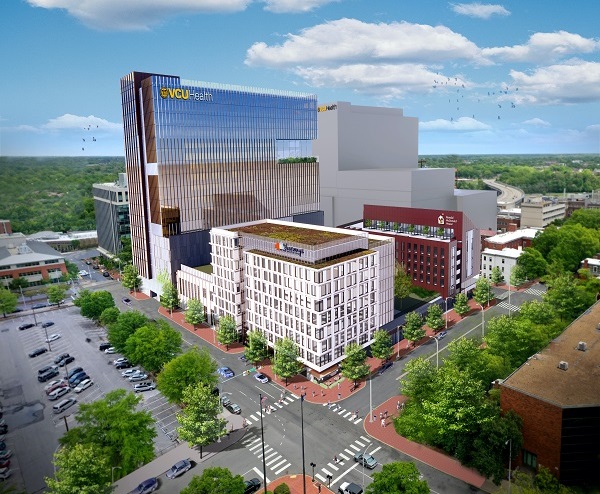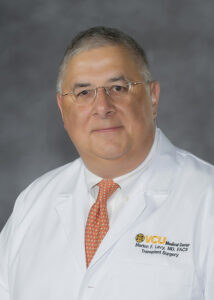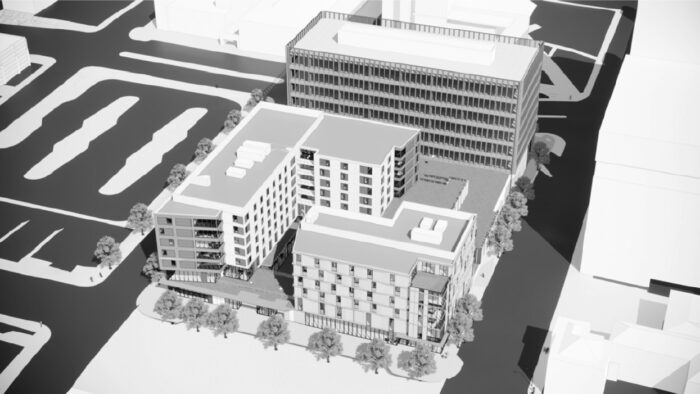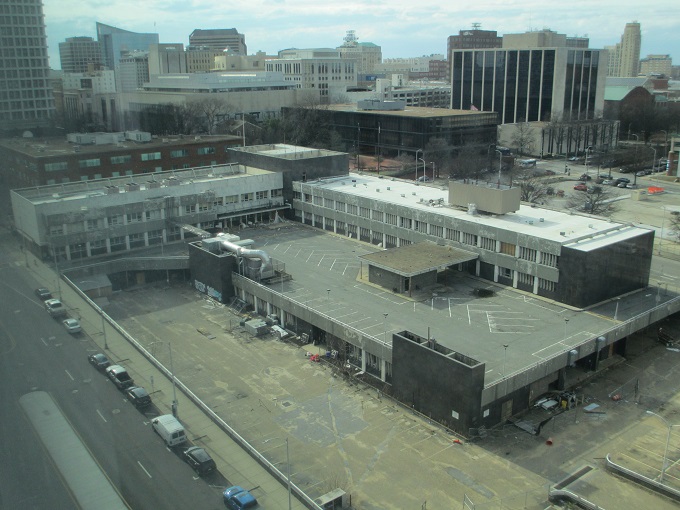
A rendering of the office tower and complex that was proposed to replace the Public Safety Building. (BizSense file)
Note: This story has been updated and revised since it was published May 5. See clarification below.
VCU Health System’s about-face on a downtown development project that relied on its lease as the master tenant cost the health system nearly $73 million, its leadership said Friday.
In response to Freedom of Information Act requests from Richmond BizSense since the project effectively died in February, VCU Health supplied a statement Friday afternoon confirming that it made a onetime payment of $72.9 million to back out of its 25-year lease agreement for the project, a $325 million redevelopment of the old Public Safety Building site at 500 N. 10th St.
The payment was made to Project 10th Street Owner LLC, the landlord and previous owner of the property, according to terms of a defeasance agreement that wound down the project. The LLC is tied to Oak Street Real Estate Capital, a division of New York-based investment firm Blue Owl Capital. Oak Street was handling financing for the project for developer Capital City Partners (CCP).
The City of Richmond, which had sold the site to the LLC in 2021 for $3.5 million, took the property back in February after determining that the project had not progressed according to a development agreement between the city and CCP. The transfer back to the city involved zero dollars, according to property records.
VCU Health’s statement, attributed to interim CEO Marlon Levy, said the health system decided to exit the project in light of challenges arising over the course of the pandemic and the financial obligations that came with the project.
“The original project plans were developed before the pandemic. While they were well intentioned, by late 2021 construction and other challenges made it simply impossible to build the original project,” the statement said. “Moving forward today would cause dire long-term financial repercussions. With that in mind, VCU Health was forced to make a difficult, but also prudent, decision to exit the original project.”
The onetime payment was needed to end VCU Health’s obligations on the site, the statement said. The payment was funded by health system operating funds.
“Making this one-time payment means avoiding far greater financial obligations and problems in the future,” the statement said.
To put the $73 million payment buyout in perspective, for the first seven months of this fiscal year, through January, VCU Health reported an operating loss of over $62 million.
According to the lease agreement signed with the landlord, VCU Health was on the hook to pay more than a half billion dollars in monthly rent over the course of the 25-year lease. The agreement called for rents to increase annually, from roughly $12.8 million the first year to nearly $32 million the final year, with the overall lease totaling more than $617 million.
To finance the project, which had been projected to take nearly four years to complete, the landlord LLC in 2021 had secured a $425 million loan from UMB Bank. About a dozen legal documents were terminated in February along with the lease agreement as part of the defeasance process to wind down the project and unwind the loan.
The parties signed a 112-page defeasance agreement that, among other things, prevents each from suing the other. It states that VCU Health asserted that the original project could not be completed, due to site conditions and other factors, without incurring “a material increase” in its cost and schedule, and that a scaled-down project would not meet the terms of the development agreement with the city.
The defeasance agreement also states that the landlord and lender rejected that position and other claims that VCU Health had asserted against them.
“However,” the document states, “to avoid the burden, expense, and distraction of potential litigation, Landlord is willing to perform its respective covenants hereunder subject to the terms of this Agreement.”
Last year, as asbestos abatement and other site preparations were getting underway on the 69-year-old Public Safety Building property, CCP filed a development plan with the city showing a three-building complex with a seven-level tower, compared to a 20-story tower that was originally proposed.
The overall square footage was reduced as well, from 545,000 to 463,000, with laboratory space proposed in place of office space that had originally been planned to support VCU Health’s nearby Children’s Hospital Pavilion and Adult Outpatient Pavilion, a 17-story building completed in 2021.
In response to the scaled-down plan, which was filed in March 2022, the City of Richmond the following month issued a default notice to CCP and the landlord stating they had failed to perform work in accordance with the development schedule, among other alleged shortcomings.
The scaled-down plan made no mention of VCU Health still being involved in the project, though a spokesperson at the time said the health system remained committed to the project.
By this February, a quitclaim deed that returned the property to the city stated that the development agreement’s requirements “were not satisfied” and “the city believes that the project cannot be constructed within the scope, budget and schedule set forth” in the development agreement.
A month later, in late March, VCU’s Board of Visitors approved a more expensive project for the site: a $415 million development to house its planned VCU Dentistry Center, which would replace the School of Dentistry’s Lyons Dental Building and Dental Building 1 on the university’s nearby MCV Campus.
The university – a separate entity from VCU Health, but with some shared leadership in President Michael Rao and others – has said the new 314,000-square-foot facility is envisioned as “a grand gateway” for its downtown medical center.
It isn’t clear whether VCU would buy the Public Safety Building property from the city and develop the project itself. University ownership would take the 3-acre property off the city’s tax rolls, as VCU is exempt from paying city real estate taxes. With VCU Health leasing the previously planned project, the property would have remained taxable under the LLC’s private ownership.
In Friday’s statement, which also was posted on VCU Health’s website, Levy said VCU – the university – is working with the city and the state “to develop new plans that will benefit students, patients, our communities and Virginia.”
“The property is envisioned as a signature development for VCU and Richmond with potentially a new facility for VCU’s School of Dentistry as the centerpiece,” the statement said.
May 6 clarification: VCU Health and VCU have separate oversight from their respective boards, not shared board oversight as previously described. They do have some shared leadership in President Michael Rao and other dual administrators and board members. The two boards also occasionally conduct meetings jointly.
BizSense reporter Jack Jacobs contributed to this report.

A rendering of the office tower and complex that was proposed to replace the Public Safety Building. (BizSense file)
Note: This story has been updated and revised since it was published May 5. See clarification below.
VCU Health System’s about-face on a downtown development project that relied on its lease as the master tenant cost the health system nearly $73 million, its leadership said Friday.
In response to Freedom of Information Act requests from Richmond BizSense since the project effectively died in February, VCU Health supplied a statement Friday afternoon confirming that it made a onetime payment of $72.9 million to back out of its 25-year lease agreement for the project, a $325 million redevelopment of the old Public Safety Building site at 500 N. 10th St.
The payment was made to Project 10th Street Owner LLC, the landlord and previous owner of the property, according to terms of a defeasance agreement that wound down the project. The LLC is tied to Oak Street Real Estate Capital, a division of New York-based investment firm Blue Owl Capital. Oak Street was handling financing for the project for developer Capital City Partners (CCP).
The City of Richmond, which had sold the site to the LLC in 2021 for $3.5 million, took the property back in February after determining that the project had not progressed according to a development agreement between the city and CCP. The transfer back to the city involved zero dollars, according to property records.
VCU Health’s statement, attributed to interim CEO Marlon Levy, said the health system decided to exit the project in light of challenges arising over the course of the pandemic and the financial obligations that came with the project.
“The original project plans were developed before the pandemic. While they were well intentioned, by late 2021 construction and other challenges made it simply impossible to build the original project,” the statement said. “Moving forward today would cause dire long-term financial repercussions. With that in mind, VCU Health was forced to make a difficult, but also prudent, decision to exit the original project.”
The onetime payment was needed to end VCU Health’s obligations on the site, the statement said. The payment was funded by health system operating funds.
“Making this one-time payment means avoiding far greater financial obligations and problems in the future,” the statement said.
To put the $73 million payment buyout in perspective, for the first seven months of this fiscal year, through January, VCU Health reported an operating loss of over $62 million.
According to the lease agreement signed with the landlord, VCU Health was on the hook to pay more than a half billion dollars in monthly rent over the course of the 25-year lease. The agreement called for rents to increase annually, from roughly $12.8 million the first year to nearly $32 million the final year, with the overall lease totaling more than $617 million.
To finance the project, which had been projected to take nearly four years to complete, the landlord LLC in 2021 had secured a $425 million loan from UMB Bank. About a dozen legal documents were terminated in February along with the lease agreement as part of the defeasance process to wind down the project and unwind the loan.
The parties signed a 112-page defeasance agreement that, among other things, prevents each from suing the other. It states that VCU Health asserted that the original project could not be completed, due to site conditions and other factors, without incurring “a material increase” in its cost and schedule, and that a scaled-down project would not meet the terms of the development agreement with the city.
The defeasance agreement also states that the landlord and lender rejected that position and other claims that VCU Health had asserted against them.
“However,” the document states, “to avoid the burden, expense, and distraction of potential litigation, Landlord is willing to perform its respective covenants hereunder subject to the terms of this Agreement.”
Last year, as asbestos abatement and other site preparations were getting underway on the 69-year-old Public Safety Building property, CCP filed a development plan with the city showing a three-building complex with a seven-level tower, compared to a 20-story tower that was originally proposed.
The overall square footage was reduced as well, from 545,000 to 463,000, with laboratory space proposed in place of office space that had originally been planned to support VCU Health’s nearby Children’s Hospital Pavilion and Adult Outpatient Pavilion, a 17-story building completed in 2021.
In response to the scaled-down plan, which was filed in March 2022, the City of Richmond the following month issued a default notice to CCP and the landlord stating they had failed to perform work in accordance with the development schedule, among other alleged shortcomings.
The scaled-down plan made no mention of VCU Health still being involved in the project, though a spokesperson at the time said the health system remained committed to the project.
By this February, a quitclaim deed that returned the property to the city stated that the development agreement’s requirements “were not satisfied” and “the city believes that the project cannot be constructed within the scope, budget and schedule set forth” in the development agreement.
A month later, in late March, VCU’s Board of Visitors approved a more expensive project for the site: a $415 million development to house its planned VCU Dentistry Center, which would replace the School of Dentistry’s Lyons Dental Building and Dental Building 1 on the university’s nearby MCV Campus.
The university – a separate entity from VCU Health, but with some shared leadership in President Michael Rao and others – has said the new 314,000-square-foot facility is envisioned as “a grand gateway” for its downtown medical center.
It isn’t clear whether VCU would buy the Public Safety Building property from the city and develop the project itself. University ownership would take the 3-acre property off the city’s tax rolls, as VCU is exempt from paying city real estate taxes. With VCU Health leasing the previously planned project, the property would have remained taxable under the LLC’s private ownership.
In Friday’s statement, which also was posted on VCU Health’s website, Levy said VCU – the university – is working with the city and the state “to develop new plans that will benefit students, patients, our communities and Virginia.”
“The property is envisioned as a signature development for VCU and Richmond with potentially a new facility for VCU’s School of Dentistry as the centerpiece,” the statement said.
May 6 clarification: VCU Health and VCU have separate oversight from their respective boards, not shared board oversight as previously described. They do have some shared leadership in President Michael Rao and other dual administrators and board members. The two boards also occasionally conduct meetings jointly.
BizSense reporter Jack Jacobs contributed to this report.



So the tax payers of the Commonwealth just paid $73 million for VCU to exit the project? Wow.
On a building that the city sold for $3.5m 2 years ago. Impressive!!
VCU paid this bill not the Commonwealth.
VCU Health System, not the university. The statement in the story about student fees is not relevant. The University and the Health System are separate financially.
Only a small percentage of VCU’s income is derived from the taxpayers of the Commonwealth. Its economical contribution to the region far eclipses its cost.
Yeah, I thought the last Anti-VCU person died off. Maybe some fringe “anti-big” folks in that old soggy working class neighborhood near the river, but the ghostly Confederistas seem to have left the building. Meanwhile, you are correct; All Hail Lord Trani! Seriously, we should replace one of those monuments with a statue of Trani like they do in places like Pennsylvania — erect a monument to a teacher and not a general. I say this sincerely, but also as someone who liked the old heroic looking statues no matter who it was they depicted — I also like the… Read more »
And how much $ does the Commonwealth
distribute to VCU every year? I don’t have the
Exact figure, but I bet it’s quite a bit when you look
into it.
The $73M will likely be used to kick off the Green City development. See what the developer did there? Sneakily brilliant!
CCP didn’t own the public safety building and didn’t get the $73M.
Vcu could have used this money to help the cancer center for which they just asked me to contribute.
The state of Virginia hands 73 million dollars over to a private equity firm who is not only the new landlord but financier of this project who promptly “ backs out of the deal” no questions asked and the state owes them money? This outfit is just then allowed to go one county over and do the same thing again? There’s no investigation into this fraud?
Why the ratio? In all seriousness, Julian is asking questions that need to be investigated and answered? And if you know the answer to some of his questions, why not post them?
I was going to make a snarky comment but reading this I have to point out that to get something done on this scale, some pretty hefty amounts need to be FIRMLY spelled out in a legally binding way by contract, which involves a lot of players making firm commitments themselves — you can’t leave others in the lurch without getting sued, and you will lose the suit even if you can prove that “conditions have changed and it makes no sense for us to try to meet our commitments” This is what is known as a settlement, and if… Read more »
Here to point out the obvious. Property was acquired for $21 million and the buyout was for $70+ million. Excellent return on investment for a project that never even came to fruition.
There are so many frustrating items of grift in this story, it is hard to pinpoint one. But VCU MCV acts like they lost so much money (poor VCU), but doesn’t the $62 mil loss they site, INCLUDE the $73 mil buy out? “for the first seven months of this fiscal year, through January, VCU Health reported an operating loss of over $62 million.” Here is their 21-22 annual report – which states a FAR different story of financial losses. https://annualreports.vcu.edu/health-facts-and-figures.html . So we are supposed to be OK with VCU MCV losing $74 mil now so they can spend… Read more »
That’s 22.5% of the projected project cost!
On what planet does this make sense.
This is financial insanity and many heads
Should roll! What color mask was the recipient
Of the $73M wearing? Wonder what Youngkin
thinks about this waste of resources?
Nothing to hide here!! Just bring your FOIA request.
Why make us (citizens) pay exorbitant FOIA fees when VCU MCV should just be more transparent with their monies. Remember, it is the insurance companies and tax payers that will pass on the losses from VCU MCV.
The F in FOIA does not mean free of charge to get the info.
Well, I guess Richmond will ALWAYS have the Public Safety Bldg — time to figure out what to do with it. “Arts’ Collective”??? I might be on to something — when I was a baby in the Lower East Side, my parents recalled that there were a bunch of annoying squatters across the street. When the building burnt down like the Ghostship in Oakland, there was debate on whether the squatters or the evil building owners started the blaze. When I lived in Berlin for a while in the mid 90s, there were LOTs of big bldgs that squatters had… Read more »
Anybody else look into all the business entity names and the business entity washing? It’s insane. A lot of different paths of inquiry to choose from here and I was surprised how many of them ultimately led to Black Rock, Blue Owl, and wtf George Soros? I thought instagram was trying to radicalize me seeing this guy’s name pop up all the time and just rolling my eyes into oblivion…unless Google is trying to radicalize me too…hmm It’s just a super weird deal to have such an expensive escape clause here that was papd so quickly in secret and is… Read more »
Totally AGREED – I did a cursory search on Virginia’s SCC & nada, zilch. Only listed the LLC filer. smh.